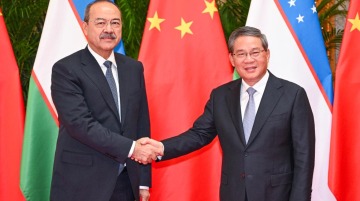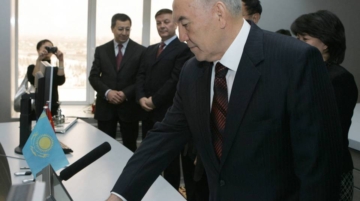
Less than a year after signing a strategic partnership with Azerbaijan in 2024, China and Azerbaijan elevated their relationship to a comprehensive strategic partnership during Azerbaijani president’s recent state visit to Beijing. The move goes far beyond simple ceremonial diplomacy—it’s a deliberate reinforcement of China’s charm offensive to capitalize on opportunities and strengthen its position across the developing world.
While Western powers navigate through turbulent waters of their own making, Beijing has methodically cultivated relationships with countries like Azerbaijan, offering development partnerships that appeal to emerging economies. This calculated diplomatic maneuver not only secures China’s economic interests along crucial trade corridors but also demonstrates to the Global South that powerful alliances can be forged outside the Western paradigm of international engagement.
Three Pillars of the New Partnership
At the core of the China-Azerbaijan comprehensive strategic partnership are three elements that reflect a new phase of structured, long-term cooperation:
- Institutionalized Economic Cooperation
China and Azerbaijan have agreed to establish a working group on investment cooperation. The move marks a formalized and forward-looking approach to trade and investment. This mirrors similar models China has used effectively in Central Asia, where institutional mechanisms like working groups have facilitated deeper economic integration and more effective implementation of joint projects.
For Beijing, a deepening relationship with Azerbaijan creates a chance for China to strengthen its foothold in the South Caucasus—a region where U.S. policy has often been inconsistent.
For Baku, aligning with China supports its development goals by attracting investment from Chinese companies.
- Renewable Energy Collaboration
During the Azerbaijani president’s visit to China, the countries signed six agreements focused on renewable energy projects, covering construction of solar and wind power plants as well as battery energy storage systems. This growing green partnership reflects interest for green energy cooperation on both sides.
For Beijing, the collaboration enables Chinese companies to expand its renewable energy footprint, export overcapacities in clean tech components, and gain market share in Azerbaijan’s renewable energy sector amid the rapid expansion of the renewable energy market in Central Asia.
For Baku, Chinese expertise and cost-effective solutions help accelerate its own green agenda. With a target of reaching 6.5 GW of renewable energy capacity and making renewables at least 30% of its energy mix by 2030, Chinese investment supports both economic and environmental goals.
- People-to-people connectivity
The final critical agreement forged through the comprehensive strategic partnership is the mutual visa exemption, which aims to strengthen people-to-people exchange between the two countries. Since 2023, China has expanded unilateral visa-free access to travelers from 38 countries, using this approach to attract people from developing nations and showcase China’s modernization and development.
For Beijing, this strategy is a soft power tool designed to increase positive perceptions of China among developing countries.
For Baku, visa exemption serves as an opportunity to attract Chinese tourists and promote Azerbaijani business engagement in China’s vast market.
Rebalancing Foreign Policy in a Multipolar World
The comprehensive strategic partnership between China and Azerbaijan serves both countries, enabling them to deepen their relationship amid geopolitical chaos. The growing partnership with Azerbaijan is one component of China’s charm offensive in the Global South, positioning itself as a reliable and stable partner against the backdrop of aggressive US trade policy.
For Azerbaijan, growing partnership with China can be seen as a part of a broader recalibration of Azerbaijan’s foreign policy. Traditionally balancing ties with the EU, U.S., Russia, Iran, and Türkiye, Azerbaijan’s pivot toward China represents a strategic expansion of its multi-vector diplomacy.
Yunis Sharifli is CGSP’s Non-Resident Fellow for Central Asia.






